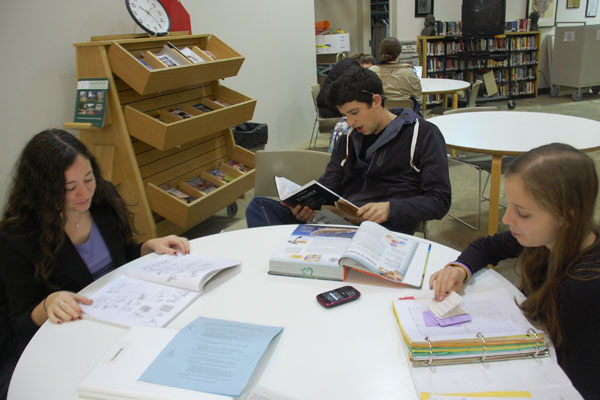How Much Homework is Too Much?

Photo from Beachcomber archives
After a long day at school, freshman Arielle Tindel goes home and walks her dogs. After that she grabs a snack.
“Then I either start my homework or practice piano, depending on how much homework I have,” Tindel said.
BHS students spend a lot of time on homework. Teachers and parents tell us it’s good for us. But is it really?
The Beachcomber asked freshman college prep teachers to administer surveys about homework habits and attitudes. We asked how many hours students spend daily and weekly on homework, if they find the homework beneficial, if they feel their homework tends to be “busy work” or if it has true educational value.
No honors classes were surveyed.
Based on the 53 surveys collected, BHS freshmen in college prep classes spend an average of three hours per night on homework.
English teacher Casey Matthews said she expects about 1-2 hours per night of reading. She also feels that on average, students should spend about 3-4 hours total on homework.
In 2006, Harris Cooper, professor at Duke University, published a review of homework studies published in recent decades. The study found that high school students had an average of 1 1/2 to 2 1/2 hours of homework per night. Many BHS freshmen who took the Beachcomber survey are spending more than twice the national averages identified in Harris’s study.
Both the National Education Association and the National Parent Teachers Organization endorse the “10 minute rule.” Educators multiply the child’s grade by 10, to determine how many minutes of homework students should have.
“Kids are developing more school-related stomachaches, headaches, sleep problems, and depression than ever before,” according to William Crain, PhD, as quoted in the Huffington Post.
Most of the students who took the survey complained of lack of sleep, anxiety, depression and lack of a social life.
Students feel that homework restricts them from doing other activities like hanging out with friends or practicing an instrument.
“I can’t really get much done until my homework is done,” said Tindel.
According to the Beachcomber survey, students spend an average of about 20 hours on their homework per week.
21% of the freshman who took the survey felt that all of their homework is beneficial.
38% of freshmen surveyed felt that some of their homework is “busy work.” The students define busy work as posters, paragraphs, vocab and practice with concepts that students already discussed and learned in class.
“After a certain amount of homework, the positive effect of achievement disappears and even might turn negative,” wrote Harris Cooper in a NY Times op/ed published in 2010.
Teachers report different reasons for giving homework: to reinforce the topic, to complete independent projects or to cover material that could not be adequately covered in class.
BHS students develop a variety of strategies for dealing with their heavy workload ranging from procrastination to confrontation.
“Usually I like to get the easy [homework] done and then work on the hard [homework] and then just go to bed,” Tindel said.












